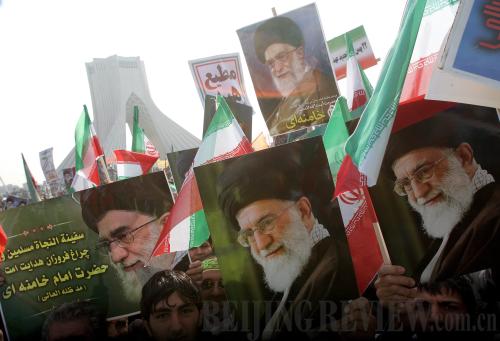|
 |
|
RALLYING FOR THE REPUBLIC: Iranians celebrate the 31st anniversary of Iran's Islamic Revolution in Tehran on February 11. That day President Mahmoud Ahmadinejad also announced that Iranian nuclear scientists had successfully enriched a higher grade of uranium (XINHUA) |
The year 2010 unfolded with conflicting developments in the arena of nuclear non-proliferation. Positive news foreshadowed the resumption of the once "dead" six-party talks regarding hostilities on the Korean Peninsula. On the other hand, the Iranian nuclear issue took a downward turn.
Recently, Tehran rejected an International Atomic Energy Agency (IAEA) proposal to ship Iran's existing low-grade uranium to Russia and France for enrichment to a higher-level. Instead, President Mahmoud Ahmadinejad ordered Iran's nuclear agency to rejuvenate its own efforts to enrich uranium to 20 percent purity.
On February 11, during celebrations marking the 31st anniversary of the 1979 Islamic Revolution, Ahmadinejad said that Iran had successfully produced its first batch of 20 percent enriched uranium under the watch of the IAEA. He also reiterated before cheering crowds that Iran is now a "nuclear state."
In response, the United States and its Western allies immediately began lobbying for a harsher round of UN sanctions against Iran. During her recent visit to Qatar, most notably, U.S. Secretary of State Hillary Clinton issued several stern warnings.
On February 14, during a speech at the U.S.-Islamic World Forum in Doha, Clinton said that evidence had been "accumulating" that would soon confirm Iran's nuclear weapons ambitions.
"Iran has consistently failed to live up to its responsibility," she said. "It has refused to demonstrate to the international community that its nuclear program is entirely peaceful."
Real threats or disinformation?
The United States has good reason to feel anxious over the Iranian nuclear issue.
Domestically, the September 11 terrorist attacks have heightened public awareness of the devastating consequences that terrorism can generate. Combating terrorism and curbing the proliferation of weapons of mass destruction have been atop the agenda of the U.S. Government ever since.
Iran's decision to produce enriched uranium has generated great unease. But any serious consequences could well result from politically motivated fallout from Washington: As the U.S. midterm elections approach, a new fight for the control of Congress will soon be underway.
The Obama administration, confronted with a series of hot topics—ranging from revamping an ailing health care system to successfully prosecuting a foundering war in Afghanistan—must do all it can to show the American public progress on all fronts. The Iranian nuclear issue is no exception.
Therefore, further sanctions on Iran—perhaps from the perspective of the Obama administration—could help the Democrats win more public support in a new election cycle.
But thus far, efforts to resolve the Iranian nuclear issue have borne little fruit.
Indeed, negotiations between the five permanent members of the UN Security Council (P-5) plus Germany and Iran have gone nowhere. The effects of UN sanctions, meanwhile, have proven limited at best. Incentives, pressures and threats of military intervention have also failed to persuade Iran to retract—or even slow down—the pace of its nuclear program.
Iran's nuclear activities are indeed moving along at an unstoppable speed. For the United States, the prospect of a "hostile country" controlling the gateway of the Gulf, with nuclear weapons at its disposal, is hardly a pleasant scenario.
But could it convince the world about the validity of its alarmist concerns over the threat of Iran's nuclear capability?
It remains an open question as to whether Iranian nuclear activities are for peaceful and civilian purposes, or are meant for weapons capacity as the United States has maintained.
Iran's ability to launch an offensive nuclear program is a possibility. But the threat might well be exaggerated for the sake of a hidden agenda.
It has been revealed that several opposition activities inside Iran, some of which adopted extremist or terrorist means, were supported by the United States.
What's more, people would not forget the weapons of mass destruction allegations against Iraq, which turned out to be a serious intelligence failure.
Not surprisingly, Washington's allegations that Tehran seeks to "weaponize" nuclear power this time around are based purely on U.S. information—data that has, as of yet, to be fully substantiated by IAEA officials.
At this point, it can only be hoped that American motives are truly grounded in seeking nuclear non-proliferation for the sake of world peace, rather than changing the Iranian regime to strengthen the U.S. strategic interests in the region.
| 